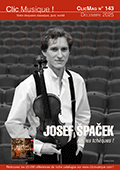 Avant Byrd, il n’avait rien, ou presque. Après Byrd, il y a le Fitzwilliam Virginal Book, cet extraordinaire recueil, compilé vers 1619, de 297 pièces pour clavier, dont 73 de Byrd. C'est ainsi qu'on pourrait résumer l'histoire de la musique pour clavier en Angleterre. William Byrd (vers 1540 – 1623) a pu être qualifié de son vivant de "Father of musick". Davantage que dans sa musique religieuse, c'est dans la musique pour clavier qu'il a donné toute la mesure de son génie novateur, à son audace, comme un Frescobaldi d'Outre-Manche. En l'absence de tradition autochtone, ses débuts sont hésitants, comme on peut en juger à l'écoute de ses premiers grounds (ostinatos). De même, ses pièces liturgiques pour orgue sont probablement des œuvres de jeunesse. Mais très vite il se révèle poète, âme du virginal, qui sonne pour lui dans toute sa noblesse. Et c'est dans le recueil "My Ladye Nevells Book", daté de 1591, et auquel ce coffret consacre 3 CD, qu'il donne toute sa mesure. Ces 42 pièces composées pendant les deux décennies précédentes, et dédiées à une aristocrate non identifiée, prennent diverses formes : Pavanes, gaillardes, fantaisies, variations, grounds, et sont présentées selon un plan organisé. « Délicates fantaisies, rythmes de danse et volutes mélodiques, d'une écriture aussi précise qu'aisée, aussi articulée que variée » (Antoine Goléa). Entre les mains de Pieter-Jan Belder, dont la maîtrise de la musique ancienne pour clavier n'est plus à démontrer, ces chants et danses, thèmes et variations poussent et bourgeonnent naturellement. (Marc Galand)  Byrd's vocal works would have assured him a place in history as the greatest English composer of his generation. Yet he was also the outstanding composer of his time in the realm of instrumental music - indeed, probably the first musician to achieve supreme stature simultaneously in music for voices, for instrumental consort and for solo keyboard instrument. This richly imaginative and polished music gives no hint of its pioneer nature; considering the keyboard tradition, or rather the apparent lack of tradition before Byrd, the originality of his achievement is awesome. His genius is to transfer with such apparent ease his ideas from the brain to the page, and to the keyboard, without spoiling their freshness in the process. ‘The Naturall inclination and love to the Art of Musicke,’ he wrote, ‘wherein I have spent the better part of mine age, have been so powerfull in me, that even in my old yeares which are desirous of rest, I cannot containe my selfe from taking some paines therein.’ His words indicate not only a continually refreshed wellspring of imagination but also a perfectionist temperament that continually drove him to refine his technique. In the hands of Pieter-Jan Belder, whose experience in the field of 17th-century keyboard music is almost unrivalled, these songs and dances and themes and variations seem to develop and unfold as naturally as a tree buds and spreads. Only one recording of Byrd’s complete music for keyboards has been made before now, and it is now unavailable, leaving this new recording by Pieter-Jan Belder in magnificent solitude. The collection begins with two discs of pieces for organ, played on a trio of Dutch instruments chosen for their varied colours and sizes. CD3 and 4 contains the pieces to be found in the Fitzwilliam Virginal Book, of which Belder made the first ever complete recording for Brilliant Classics. The last three discs are dedicated to My Lady Nevells Booke, the beautifully preserved collection which most comprehensively preserves his contribution to keyboard literature.
 |
